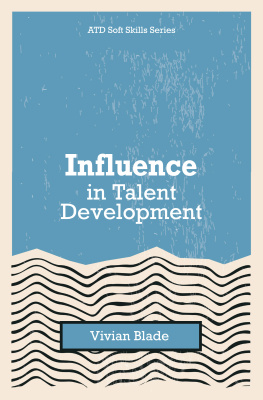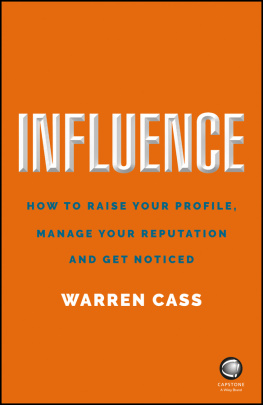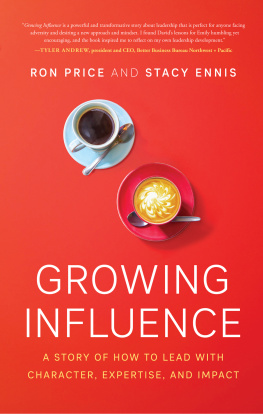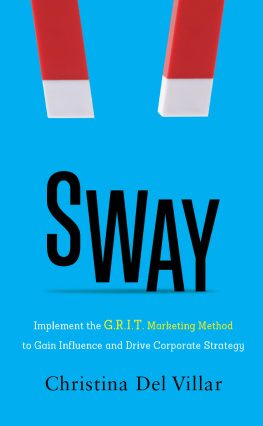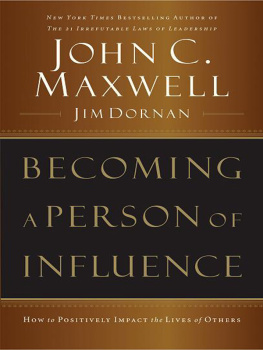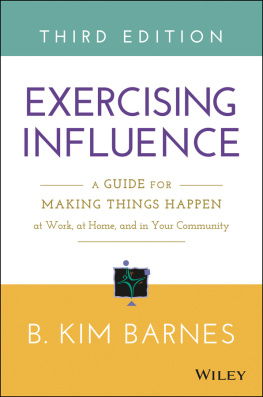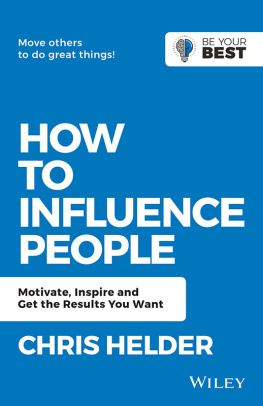

2022 ASTD DBA the Association for Talent Development (ATD)
All rights reserved. Printed in the United States of America.
25 24 23 22 1 2 3 4 5
No part of this publication may be reproduced, distributed, or transmitted in any form or by any means, including photocopying, recording, information storage and retrieval systems, or other electronic or mechanical methods, without the prior written permission of the publisher, except in the case of brief quotations embodied in critical reviews and certain other noncommercial uses permitted by copyright law. For permission requests, please go to copyright.com, or contact Copyright Clearance Center (CCC), 222 Rosewood Drive, Danvers, MA 01923 (telephone: 978.750.8400; fax: 978.646.8600).
ATD Press is an internationally renowned source of insightful and practical information on talent development, training, and professional development.
ATD Press
1640 King Street
Alexandria, VA 22314 USA
Ordering information: Books published by ATD Press can be purchased by visiting ATDs website at td.org/books or by calling 800.628.2783 or 703.683.8100.
Library of Congress Control Number: 2021943871
ISBN-10: 1-952157-53-6
ISBN-13: 978-1-952157-53-0
e-ISBN: 978-1-952157-54-7
ATD Press Editorial Staff
Director: Sarah Halgas
Manager: Melissa Jones
Content Manager, Career Development: Lisa Spinelli
Developmental Editor: Kathryn Stafford and Jack Harlow
Production Editor: Hannah Sternberg
Text Design: Shirley E.M. Raybuck
Cover Design: John Anderson Jr.
Printed by BR Printers, San Jose, CA
About the Series
The world of work is changing. As companies once prioritized radical workplace performance and productivity improvements, they focused on training their employees with the purpose of getting more work done faster. But companies have learned that while their people might be increasingly productive, they arent working better, particularly with each other. Lurking on the horizon is always greater automation, which will continue to shift the balance between the needs for hard and soft skills. Employees of the future will spend more time on activities that machines are less capable of, such as managing people, applying expertise, and communicating with others. More than ever, soft skills are being recognized as a premium.
Enter talent development.
TD professionals play a unique role in addressing the increasing demand for soft skills. They work with people and on behalf of people: A trainer facilitating a group of learners. A team of instructional designers working cross-functionally to address a business need. A learning manager using influence to make the case for increased budget or resources. But how can TD professionals expect to develop future employees in these soft skills if theyre not developing their own?
At the Association for Talent Development (ATD), were dedicated to creating a world that works better and empowering TD professionals like you to develop talent in the workplace. As part of this effort, ATD developed the Talent Development Capability Model, a framework to guide the TD profession in what practitioners need to know and do to develop themselves, others, and their organizations. While soft skills appear most prominently under the Building Personal Capability domain, these crucial skills cross every capability in the model, including those under Developing Professional Capability and Impacting Organizational Capability. Soft skills enable TD professionals to take their instructional design, training delivery and facilitation, future readiness, change management, and other TD capabilities to the next level.
Just as TD professionals need resources on how to develop talent, they need guidance in improving their interpersonal and intrapersonal skillsto be more adaptable, self-aware and empathetic, creative, team-oriented and collaborative, and influential and persuasive. This ATD series provides such guidance.
Organized with two parts, each book in the ATD Soft Skills Series tackles one soft skill that TD professionals need to foster in themselves to help the people and organizations they serve. turns the lens on the daily work of TD professionals and how they can practice and perfect that skill on the job. Featuring worksheets, self-reflection exercises, and best practices, these books will empower TD professionals to build career resiliency by matching their technical expertise with newfound soft skill abilities.
Books in the series:
Adaptability in Talent Development
Emotional Intelligence in Talent Development
Creativity in Talent Development
Teamwork in Talent Development
Influence in Talent Development
Were happy to bring you the ATD Soft Skills Series and hope these books support you in your future learning and development.
Jack Harlow, Series Editor
Senior Developmental Editor, ATD Press
Series Foreword
Oh, Those Misnamed Soft Skills!
For years organizations have ignored soft skills and emphasized technical skills, often underestimating the value of working as a team, communicating effectively, using problem solving skills, and managing conflict. New managers have failed because their promotions are often based on technical qualifications rather than the soft skills that foster relationships and encourage teamwork. Trainers as recently as a dozen years ago were reluctant to say that they facilitated soft skills training. Why?
Soft Skills: The Past and Now
The reluctance to admit to delivering (or requiring) soft skills often starts with the unfortunate name, soft, which causes people to view them as less valuable than hard skills such as accounting or engineering. The name suggests they are easy to master or too squishy to prioritize developing. On both counts thats wrong. They arent. In fact, Seth Godin calls them real skills, as in, Real because they work, because theyre at the heart of what we need today (Godin 2017).
Yet, as a society, we seem to value technical skills over interpersonal skills. We tend to admire the scientists who discovered the vaccine for COVID-19 over leaders who used their communication skills to engage the workforce when they were quarantined at home. We easily admit to not knowing how to fly an airplane but readily believe we are creative or can adapt on the fly. We think that because weve been listening all our lives, we are proficient at itwhen were not. As a result, we put much more emphasis on developing our technical skills through advanced degrees and posthigher education training or certifications to land that first or next job than we do on mastering our interpersonal and intrapersonal skills.
Fortunately, many businesses and their leaders are now recognizing the value of having a workforce that has technical knowledge supported by soft skills. Thats good because soft skills matter more to your career than you may envision. Consider: as a part of the Jobs Reset Summit, the World Economic Forum determined that 50 percent of the workforce needed reskilling and upskilling. The summit also identified the top 10 job reskilling needs for the future. Eight of the 10 required skills in the 21st century are nontechnical; these skills include creativity, originality, and initiative; leadership and social influence; and resilience, stress tolerance, and flexibility (Whiting 2020). LinkedIns 2019
Next page
